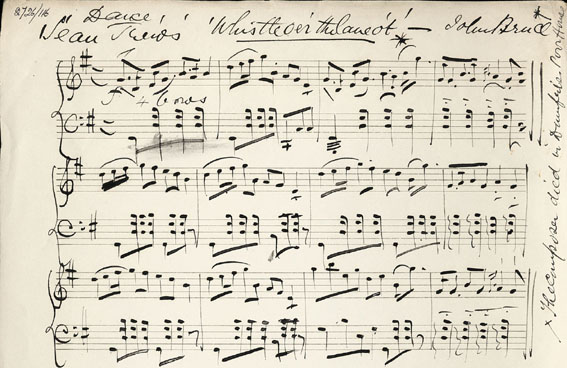 |
|||||

Best viewed in
|
Whistle O’er the Lave O't is most commonly used in Highland dance for the slow steps of the Seann Truibhas. Seann Triubhas is a Gaelic phrase which means "Old Trousers". It is called this because the Scottish wanted a way of celebrating getting their Scottish culture back from the British. There has been a widely accepted story that the kicking or sweeping movements of the legs in the first step represented the attempt of the dancer to shake off the 'despicable' trews, but D.G. MacLennan writes in Traditional Highland and Scottish Dances that 'this first step has nothing to do with the idea of kicking off the trews, but...is new to the dance and was composed by myself'. The Seann Triubhas, then, is simply about a pair of old trews which may or may not have been a subject of distaste or fun to the wearer, and may or may not have something to do with the Jacobite Rebellion of 1745. Trews were anciently associated with the Celts. Tartan trews were part of the Highland wardrobe for chieftains and gentlemen whilst on horseback from the early 17th century onward. Some Seann Triubhas steps seem to have originated from hard shoe dancing, and the dance was taught to be performed in regular shoes with heels by dancing masters in the 19th century. In the late 18th century, the dance was performed to a fiddle tune called 'Seann Triubhas Uilleachan' (Gaelic for 'Willie's old trousers'), previously and more scurrilously called 'The De'il Stick the Minister'. When the dance began to be incorporated into Highland Dance competitions, which were usually played for by pipers, the tune was changed to 'Whistle O'er the Lave o't', which could be played on the bagpipe and is the tune commonly used for the dance today.
A manuscript in James Scott Skinner's hand (above), for the Dance Seann
Triubhas, indicates the tune is by John Bruce. Skinner hasn't given
detailed bowing, but tells the player to use '4 bows' to each bar. The
printed bass line uses only octave crotchets. Along the right margin he
wrote 'The composer died in Dumfries Poorhouse.' Bruce (c. 1720-1785)
was a Jacobite soldier, played for dances, and was a 'remarkable Reel
Fiddler'.
Lyrics Whistle o’er the lave o’t" appears to have been an all-purpose chorus to any number of bawdy tunes.
|
||||

